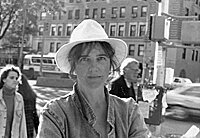Jack Nicholson directed Drive He Said in Eugene, the year after the U of O campus was used as the setting for Getting Straight.
“Drive, He Said,” loosely adapted by Jeremy Larner and Jack Nicholson from Larner’s 1964 Delta Prize novel, and directed by Nicholson (his directorial debut), comes close to being the sort of movie about the anxieties and dilemmas of the sixties that no one ever made in the sixtieswhich were constantly confused with the more innocent fifties. It is not a great film, but it is an often intelligent one, and it is so much better than all of the rest of the campus junk Hollywood has manufactured in the last couple of years that it can be indulged its sentimental conventions.
Specifically, it’s about a star college athlete, Hector Bloom, to whom basketball is what boxing is to Private Prewitt what playwriting maybe to Tennessee Williams and what risking an arm or a leg or a life probably is to Peter Gimbel. Like some forms of art, it is, simultaneously, a heightened response to the world, a mystical retreat from it, and a practical way of getting along in it.
In the course of his senior year, Hector begins to feel, in his word, disconnected. The old game doesn’t quite mean what it once did. He is more than a little surprised to find that he is in love with Olive, the professor’s wife with whom he’s been having an affair, and he is shocked when the joy of his discovery isn’t shared by Olive, who is not so simply pregnant.
Hector admires and envies the campus radicals, who are so committed to a cause that they can interrupt a basketball game for an anti-Vietnam demonstration, staged as guerrilla theater. He himself hasn’t the faintest idea where he is going or why. When a pro ball club asks him to sign, he demands only that the club improve the quality of the frankfurters it sells to the public, and cut the price from 50c to a quarter.
In fact, Hector is so disconnectedat least in terms of the character as writtenthat it comes as a major surprise, late in the film, to learn that he is a Greek major. This bit of information, which I assume is presented seriously, is as unsettling as learning that someone you thought you knew extremely well is, in reality, one-half of a pair of twins. It means that an important (or, at the least, a time-consuming) part of Hector’s life has been kept secret.
Also fairly secret is Hector’s state of mind, though William Tepper, a tall, dark-haired young man who may or may not have studied the collected works of Dustin Hoffman, defines well enough Hector’s individual attitudes of frustration, anger and what might be called romantic campus lassitude. A reading of Larner’s novel fills in a lot of these gaps, but otherwise the novel might mislead the filmgoer into expecting satiric fantasy (which the movie never achieves), having to do with unnamed wars (not in Vietnam), with a lot of bizarre characters who might have been created by Waugh, and with middle-class American-Jewish intellectual and social life.
One result of this secrecyperhaps simplification is a better termsis that most of the other characters in the film, just because they are the supporting characters in the film as well as in Hector’s life, are more thoroughly and quickly defined, and thus more vivid and appealing than Hector. I especially liked Karen Black as the besieged Olive, a woman who once might have ben fated to be misunderstood and badly used by men, but who finally liberates herself; Robert Towne, as her husband, who would prefer to dry his beard with an electric comb than wory about cuckoldry; Bruce Dern, as the intensely clean-living coach, and Michael Margotta, who looks like a young Elisha Cook Jr., as Hector’s radical roommate whose ultimate act of survival provides the film with its obligatory, if shopworn, irony.
Most importantly, all of the film’s characters, and all of the performances, are touched with the kind of unexpected sensibility and decency that are rare in most films of this genre. It’s a quality that I associate with the performances Nicholson himself gave in both “Easy Rider” and “Five Easy Pieces.” Nicholson not only is good with actors, but he also chooses to avoid most of the visual (and aural) clichés of the day, and when he does indulge himselfas in the fine basketballl sequencesthey no longer seem clichés since the rhythm of the sport more or less demands the treatment. I wish I could report that Hector was as interesting as the film that surrounds him.
Because Drive He Said was shot in Eugene, and because it features the first screen appearance of an Oregon actor, David Ogden Stiers, I hereby claim it as an Oregon film.



0 responses so far ↓
There are no comments yet...Kick things off by filling out the form below.
Leave a Comment